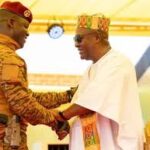
Security Analyst and Executive Secretary of the Global Security for Africa Research and Good Governance (GLOSARGG), Francis Ahovi, has weighed in on President John Mahama’s decision to host Burkina Faso’s military leader, Captain Ibrahim Traoré, at his swearing-in ceremony.
Ahovi acknowledged the significant risk Mahama took by inviting Traoré, especially as the military leader was seen carrying a sidearm during the event—a gesture that sparked widespread criticism for violating standard security protocols.
Despite the controversy, Ahovi interpreted the move as a calculated strategy to promote peaceful negotiations and encourage Burkina Faso’s return to civilian rule and re-entry into ECOWAS.
He suggested that Mahama’s willingness to engage with Traoré exemplifies his commitment to peace-building and his belief in diplomacy as a tool for fostering change.
“Mahama’s actions show his readiness to risk his image and reputation for the greater good of peace and stability in the region,” Ahovi stated.
He highlighted the strategic importance of maintaining strong relations with Burkina Faso, emphasizing shared interests like the Volta Lake and the mutual need for economic and security cooperation. According to Ahovi, Mahama’s approach reflects Ghana’s broader foreign policy strategy of building alliances, even with controversial leaders, to encourage positive outcomes.
“Before you can influence someone’s behavior, you must engage with them directly. Mahama’s decision to share the stage with Traoré demonstrates his willingness to encourage the acceptance of civilian governance, even at personal and political risk,” Ahovi added.
Ahovi praised Mahama’s courage, asserting that the president’s engagement with Traoré could pave the way for the eventual restoration of democracy in Burkina Faso. He stressed the importance of regional collaboration in addressing security and governance challenges, emphasizing that fostering harmony between Ghana and its neighbors is vital for economic and political stability.
“The relationship must continue. Harmony allows us to leverage each other’s resources, knowledge, and strengths to bolster our economies, enhance security, and uphold good governance,” Ahovi concluded.
This bold diplomatic gesture, Ahovi argued, underlines Mahama’s peace-building strategy and highlights Ghana’s role as a leader in promoting stability in West Africa.
Godfred Sey/ Ahotoronline.com




